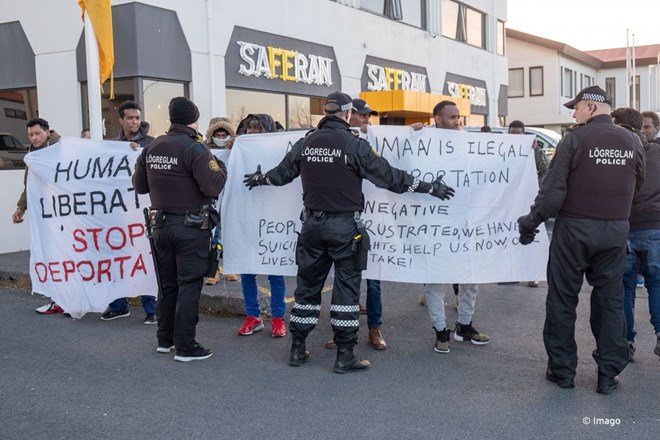
Sertan Sanderson
Saturday June 4, 2022

From file: Refugees protest in front of the immigration office in Hafnarfjörður, Iceland, against deportation and for better treatment of asylum seekers on March 5, 2019 | Photo: Imago
Iceland is intending to deport about 200 asylum seekers,
including one man with a physical disability, according to media reports.
Several organizations are protesting the plans to send people back to countries
where they may face persecution or poor and inhuman living standards. The law
might be on their side.
Iceland plans to go ahead with its plans to deport dozens of
people from the Nordic country. The Icelandic government has reportedly reduced
the number of planned deportations to 200 people, having originally planned to
send up to 300 people away. However, there is criticism about the plans to
deport the relatively small number of people.
Iceland's Vísir news platform quoted data from the
Directorate of Immigration (ÚTL), saying that most of the people pegged for
deportation come from Iraq and Nigeria.
Most of them will be sent to Greece, as this has been
established as the country where they first submitted their asylum requests.
Red Cross calls
deportation plans 'unlawful'
The Icelandic Red Cross has expressed its concern about
sending people to Greece, publishing a report that concludes that deporting
asylum seekers to Greece would be detrimental to their wellbeing.
Quoting a report by Human Rights Watch, the Icelandic Red
Cross decries "heavy-handed and often abusive immigration controls"
in Greece, adding that children in particular would be likely to suffer from
sub-standard treatment.
The Reykjavík Grapevine magazine meanwhile referred to a
November 2020 report published by the Refugee Support Aegean NGO, which says
that "(a) number of international and national courts have already held
that the living conditions of asylum-seekers and recognised refugees alike in Greece
are so dire that they are capable of amounting to 'inhuman or degrading
treatment' under Article 3 of the European Convention on Human Rights, Article
4 of the European Charter of Fundamental Rights, or Article 7 of the
International Covenant on Civil and Political Rights, and therefore prevent the
return of persons to the country in accordance with the principle of
non-refoulement."
Icelandic law
prohibits deportation to dangerous countries
Other destinations that the asylum seekers are meant to be
returned to include Hungary – a nation, which deports people to both Iraq and
Nigeria.
According to the Reykjavík Grapevine, ÚTL deems those two
countries to be safe countries of origin as well, despite the fact that many
people flee from there because of various forms of persecution.
The publication adds that sending people to unsafe nations
contravenes Icelandic law, citing Article 42 of the Law on Foreigners:
"According to this Act, it is not permitted to send a foreigner or a
stateless person to an area where he has reason to fear persecution … or due to
circumstances similar to those in the refugee concept, are in imminent danger
of dying or being subjected to inhuman or degrading treatment."
Politics in the way
of finding solutions
Scores of people held protests outside the Icelandic
parliament (Althing) last Saturday (May 28), bringing together the asylum
seekers who are affected by the government plans with supports, including
rights group Amnesty International.
Fatima Mohamud, one of the protesters, told Vísir: "We
are from Somalia, and there is a war raging there. There is no peace. We came
to Greece from Somalia. Life in Greece is very difficult. We slept outside on
the streets. There is no food, no accommodation. It is not peaceful there, and
we do not want to be moved back there."
One of the organisers, human rights activist Sema Erla
Serdar, told reporters outside Althing: "There is past precedent for
individual cases to be taken into special consideration. The only thing that is
needed to reverse this decision is the political will, which unfortunately does
not appear to be present."
While Prime Minister Katrín Jakobsdóttir is open to
discussing a halt on deportations, one of her two coalition partners, Minister
of Justice Jón Gunnarsson, has repeatedly positioned himself in favor of
deporting asylum seekers.
Meanwhile, there is no clear date set yet on when the
deportations might take place. Fatima Mahomud says she was told to be prepared
to be sent away at short notice: "We do not know exactly when but we are
told we should be ready to return to Greece and be deported.
"We want the government to help us and give us the
opportunity to live her."
With Reykjavík Grapevine, Vísir